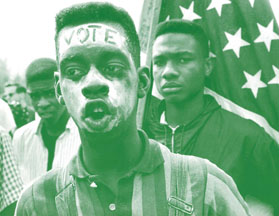By Taylor Reed VecchioContributing Writer
UMass Boston and the New Democracy Coalition recently held a forum to discuss the Voting Rights Act on its 40th anniversary. Before 1965, electoral opportunities for marginalized citizens had been significantly suppressed. In the present day, concern over dubious voting practices in the 2000 and 2004 elections lead many prominent leaders including Jesse Jackson Jr., Hillary Clinton, and John Kerry to speak out against the barriers that prevent many citizens from voting.
The panel included speakers from various communities including Ted Shaw, head of the NAACP Legal Defense and Educational Fund (LDF), Rev. Eugene Rivers, ex-gang member and founder of the internationally recognized Boston TenPoint Coalition, and Keynote Speaker Rev. C.T. Vivian, a close friend and lieutenant of Dr. Martin Luther King Jr. as well as a well-known Civil Rights figure.
Fears of the Voting Rights Act’s “expiration date” in 2007 have fueled much discussion about American democracy and voting rights. As one speaker explained, the right to vote for African Americans and other minorities cannot “expire,” leaving these citizens without the right to vote. However, enacting legislation on a permanent basis would inspire such a mirage of legal technicalities that its passage through congress is unlikely. Many Americans may be surprised to know that “the right to vote” is not explicitly stated as a constitutional right. Rather, there are specific amendments such as the 14th that provide equal rights for all. Many feel that an amendment specifically guaranteeing the right to vote for all is an absolutely necessary tool in maintaining a strong democracy. While such an amendment may not prevent inequality at the polls, the symbolic nature of such a statement would be an important acknowledgement of the rights of all Americans to vote in a fair and accessible environment.
As many speakers noted, fair and easy access to voting can be repressed by several tactics used to prevent eligible voters from participating in federal and local elections. Votes are cast and counted in a variety of ways according to state and ward regulations. The lack of uniformity makes validating close elections such as the 2000 race extremely difficult and can project a negative image of voting to the public. Low-income and minority districts are often left with antiquated and poor quality voting methods. The majority of voters in America cannot adequately verify that the vote they cast was counted, which can lead to feelings of insecurity within the voting system.
While African Americans suffered decades of grandfather clauses, poll taxes, and literacy requirements, post-civil rights generations were intimidated at the polls, given false information about their rights and corralled into crowded wards sometimes waiting up to 10 hours to cast a vote. Immigrants often dealt with the same treatment and frequently report that they were denied federally mandated bi-lingual voting access and harassment about their legal status. For new immigrants escaping often corrupt regimes and African Americans carrying a history of voter discrimination, it is crucial to project an environment of respect, fairness, and ease at the polls. The illegal tactics individuals and organized groups use to suppress minority voters further validates the idea that democracy in America is only accessible to certain people.
The New Democracy Coalition believes that there are signs that democracy is in trouble in America. They point out that African Americans and Latinos vote at lower rates and are more likely to feel that their votes do not count. Similarly, young people are less aware of their political environment and care less about civic issues. In Massachusetts fewer people are running for state office, leaving control of the state to a select few. The panel addressed possible solutions and concerns with these findings based on their experience with faith based communities and politics. Many speakers addressed their admiration and respect for Rev. C.T. Vivian, deeming him “a civil rights era giant” and an inspiration in their struggle to engage the new generation in civic hope and shatter the myth of the right to vote in America.

